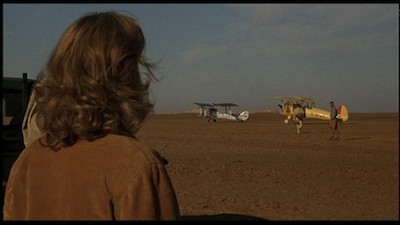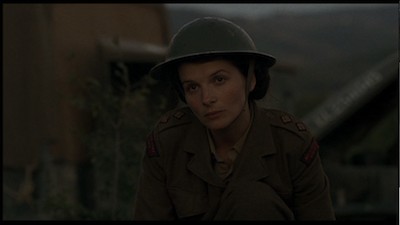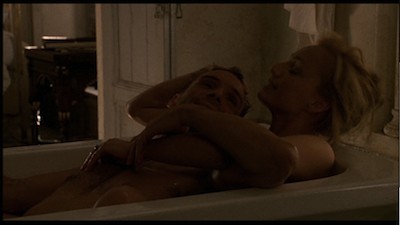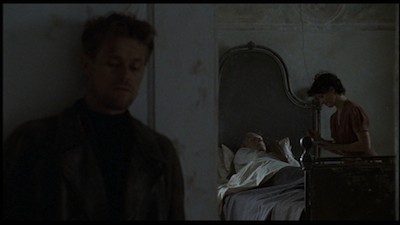| Reviews & Columns |
|
Reviews DVD TV on DVD Blu-ray 4K UHD International DVDs In Theaters Reviews by Studio Video Games Features Collector Series DVDs Easter Egg Database Interviews DVD Talk Radio Feature Articles Columns Anime Talk DVD Savant Horror DVDs The M.O.D. Squad Art House HD Talk Silent DVD
|
DVD Talk Forum |
|
|
| Resources |
|
DVD Price Search Customer Service #'s RCE Info Links |
|
Columns
|
|
|
English Patient, The
THE MOVIE:
Please Note: The screengrabs used here are from the standard-definition DVD released in 2004, not from the Blu-Ray.

I'll admit, there was a moment of doubt as I loaded The English Patient into my Blu-Ray player. It had been some years since I had seen it, and despite having loved the film when it was released fifteen years ago, all I could really think about was that episode of Seinfeld where Elaine's boyfriend breaks up with her and everyone ostracizes her because she hates it. For her, The English Patient was long and boring, and not romantic at all. "What was good about it? Those sex scenes! I mean, please! Gimme something I can use!" Instead, she goes and sees a comedy called Sack Lunch.
Well, I'm sorry, Elaine, I love you, but you're wrong. The English Patient is not long and boring, and though the romance didn't strike me as deeply this time around as it once did, I found it was replaced for me with the more impressive tales of pain and loss, of connections severed and faith shaken. You're right, it's easy to oversell the sex and the passion, but it's hard to really discount how deep the film's currents of human emotion truly run.
Anthony Minghella's 1996 award winner is an adaptation of a novel by Michael Ondaatje. It stars Lord Voldemort himself, Ralph Fiennes, as the titular English patient. He ends up in Italy in 1944 with burns all over his body and apparently no memory of who he really is. He lands in the care of Hana (Juliette Binoche, Blue), a Canadian nurse who, fed up with all the death in her life, takes him to a bombed-out monastery where he can live his last days in peace. Only, the seclusion doesn't last. They are soon joined by a group of soldiers tasked with defusing German mines left throughout the country, as well as a sketchy solo operative named David Caravaggio (Willem Dafoe, Antichrist), who claims to be trying to disarm Italian partisans but is really on his own mission of vengeance. He's convinced the burned man knows more than he's letting on.
Which is not an unfounded suspicion. As this "modern day" tale unfolds, we are also privy to the patient's memories of Egypt, 1938. In truth, he is not English at all, but the Hungarian Count Laszlo de Almásy, part of an expedition mapping the African desert and seeking out archaeologically significant locations. His group has been joined by a British couple adventuring together. Geoffrey Clifton (Colin Firth, A Single Man) and his wife Katharine (Kristin Scott Thomas, Sarah's Key ) join the team, and having a woman around significantly alters the dynamic of the all-male crew. Laszlo in particular seems shaken by Katharine's presence. He claims all the time in the desert has made him forget social niceties, but the truth is, he is immediately taken with the woman. She is equally intrigued by him, and their mutual attraction blossoms into an affair, even as the onset of war grows increasingly inevitable.

Minghella jumps back and forth between the two timelines, weaving the tales together via natural cues and believable coincidences. He strikes a good balance between each, never letting one or the other dominate, or losing track of their inevitable collision. The past belongs to Laszlo and Katharine, and the present is really about Hana. The war has taken her lover and her best friend within days of each other, and she has become convinced that she is cursed to lose everyone she cares for. Even as Laszlo's personal tragedy plays out and he approaches his end, she is finding a new beginning. Amongst the bomb squad is a Sikh soldier named Kip (Naveen Andrews from TV's Lost), and a flirtation develops between them. This leads to both the film's most romantic scene (the cathedral) and it's most nerve-wracking (the morning after). Juliette Binoche, of course, is a treasure, and Hana is one of her more subtle roles. There is a conflict between the girl's underlying innocence and the harshness of her circumstances. She is a caregiver who is finding it impossible to save anyone, and she's trying to hold on to the part of herself that believes it's worth trying.
In all honesty, the love story between Laszlo and Katharine, while steamy, is also pretty skeevy. He is an odd duck, and Fiennes plays him as perpetually out of sync with the rest of the world. It is a performance that is emotionally reserved while being surprisingly physical. Fiennes moves funny in the picture. He touches Katharine with the back of his hand rather than stroking her with his fingers. He cocks his head to the side like a dog or a bird, analyzing the situation with his instinct rather than his intellect. There is almost a "beauty and the beast" element to the relationship. Katharine is a proper British lady with a slight taste for danger, and Kristin Scott Thomas plays her as such. Yet, when her sensual side is revealed, her performance becomes physical, as well. Her body reacts to him, and she also regularly lashes out.
In making The English Patient, Anthony Minghella clearly had his eye on other large-scale productions involving war and romance. His film is like a mash-up of Gone with the Wind and Lawrence of Arabia. Just as he balances the narrative elements of the two sides of the sweeping story, he and director of photography John Seale (Prince of Persia: Sands of Time) make great use of the contrasting landscapes. The desert is golden and open, yet also desolate; the Italian countryside is green and invigorating, but contained. It's fitting that the events in the more open environment are the ones with a greater reverberation (Laszlo's actions have some influence on the African conflict), the intimacy being shared effects others; on the other hand, the personal drama in Italy is at a point where the players are closing up shop and focusing inward. It's about healing, and the secluded locale serves that. These things, you see, they keep to themselves. Even Caravaggio's anger dissipates.
The way all these threads twist around each other forms an impressive tapestry by The English Patient's end. Despite Elaine Benes' assertions that the movie is too long, The English Patient wears its length well. It never feels like a moment is extraneous or overdone. Rather, all the details fit, and together, they form a truly satisfying whole.

THE BLU-RAY
Video:
The 1080p widescreen transfer for The English Patient is lovely to look at, with lots of fine texture and detail evident throughout. Color is strong, and there is no apparent wear or glitches in terms of the surface print. Quibblers might note a lack of depth in some scenes; for as wide in scope as John Seale's camerawork can be, it doesn't feel like you can reach as far back into the image as is often the case with other Blu-Ray presentations. Also, I noticed a similar problem here as in the transfer on The Piano BD, where some scenes seemed grainier and lacking the sharpness of the rest of the movie. This was a far more rare occurrence on The English Patient, but it was noticeable. All in all, a perfectly fine HD upgrade, though perhaps a cursory one. (Though, in reviewing my old disc to grab images from it, I'd say the previous release was considerably darker than this one.)
Sound:
The soundtrack has been remixed in 5.1 DTS-HD Master Audio, and it is excellent. Dialogue is always clear and balanced, and there is some real punch to some of the louder scenes, particularly the wartime footage.
There are also options for English, Spanish, and English SDH subtitles. All other language dubs are absent (Spanish and French were offered on the previous DVD release).
Extras:
The bonus features on the single-disc English Patient Blu-Ray exactly mirror the supplements from the two-disc special edition DVD released in 2004.
The means not one, but two full-length audio commentaries, one with Minghella by himself, and the other in conversation with producer Saul Zaentz and novelist Michael Ondaatje. Essentially, one is the writer/director's personal ruminations on his movie, the other is more of a varied look at the journey to the screen.
The actual featurettes on the disc vary in length and subject. The twenty-minute "About Michael Ondaatje" focuses on the author and the source material, while the writing is also given consideration in the 7-minute "From Novel to Screenplay: Interviews with Cast and Crew." The cast and crew additionally weigh in on their producer in the super short (2 minutes) "The Formidable Saul Zaentz", while the actual real-life source of Ralph Fiennes' character is given his due in the eight-minute "A Historical Look at the Real Count Almásy."
For those who didn't get enough production knowledge from the commentaries, there is nearly 90 minutes of interviews with Minghella, Zaentz, Ondaatje, and editor Walter Murch in the "Filmmaker Conversations" section, and also individual features on other members of the team: "The Work of Stuart Craig - Production Designer" and "The Eyes of Phil Bray - Still Photographer."
Finally, there is a 20-minute "Master Class" with Minghella discussing ad showing deleted scenes and your run-of-the mill "Making Of" that runs just over 50 minutes.
Theatrical trailers for other films are included, but not for The English Patient.
FINAL THOUGHTS:
Highly Recommended. The English Patient is a modern epic, spanning the years from before the start of WWII to the days just after armistice was declared. It follows two intersecting timelines and the reverberations caused by an affair between an Hungarian count (Ralph Fiennes) and a British aristocrat (Kristin Scott Thomas). Included in its sweeping themes are love, loss, the power of storytelling, and the difficult choices that lead to true healing. The Blu-Ray features a good transfer along with all the extras from the original DVD release, making for a solid upgrade.

Jamie S. Rich is a novelist and comic book writer. He is best known for his collaborations with Joelle Jones, including the hardboiled crime comic book You Have Killed Me, the challenging romance 12 Reasons Why I Love Her, and the 2007 prose novel Have You Seen the Horizon Lately?, for which Jones did the cover. All three were published by Oni Press. His most recent projects include the futuristic romance A Boy and a Girl with Natalie Nourigat; Archer Coe and the Thousand Natural Shocks, a loopy crime tale drawn by Dan Christensen; and the horror miniseries Madame Frankenstein, a collaboration with Megan Levens. Follow Rich's blog at Confessions123.com.
|
| Popular Reviews |
| Sponsored Links |
|
|
| Sponsored Links |
|
|
| Release List | Reviews | Shop | Newsletter | Forum | DVD Giveaways | Blu-Ray | Advertise |
|
Copyright 2024 DVDTalk.com All Rights Reserved. Legal Info, Privacy Policy, Terms of Use,
Manage Preferences,
Your Privacy Choices | |||||||













